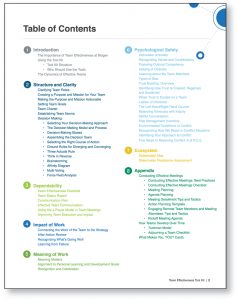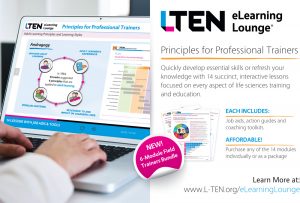Biogen: Creating A Team Effectiveness Approach
Feature Story – By Liz McLean
Developing a team as a unit is equally as important as developing individuals.
Teams play a significant role in enabling Biogen’s success and are becoming increasingly important in how work is accomplished. When it comes to team effectiveness, having several qualified individuals is not enough. It is also critical to focus on how these individuals work together and interact to deliver on their goals.
 Improving how a team operates has many benefits, including:
Improving how a team operates has many benefits, including:
- Higher quality of overall team deliverables and output.
- Additional learning opportunities for the entire team.
- Enhanced ability to meet established milestones and deadlines.
- Increased morale and motivation.
Given these benefits, the development of the team as a unit is equally as important as individual development. Therefore, Biogen invested in creating a team effectiveness approach, assessment and toolkit.
Design and Development
The Biogen Team Effectiveness toolkit originated in Biogen’s Research & Development (R&D) function. The R&D team engaged organization effectiveness within HR because they recognized that teams from all functions would benefit from team effectiveness content. The design and development process has involved close collaboration between the organization effectiveness team and multiple business functions across the organization.
Biogen’s team effectiveness model is based on research conducted by Google on what makes a team successful. After studying 180 teams, Google identified five domains that have the biggest impact on team performance: structure and clarity, dependability, impact of work, meaning of work and psychological safety.
Biogen reviewed this research and added a sixth domain, ecosystem. Given Biogen’s matrixed environment, understanding Biogen’s ecosystem and how to effectively operate within it is crucial for team success.
The toolkit is organized into these six domains and includes several resources teams can use to develop in any of the domains. To determine where to focus within the toolkit, teams have the option to assess themselves through a conversation, domain scorecard or formal diagnostic.
Team effectiveness is an ongoing and evolving goal.
Biogen created multiple options so teams could select the approach best-suited for their needs and the amount of time they want to invest. This toolkit was built for leaders to be able to lead this work independently of HR, if they so choose.
Implementation Considerations
When planning for a team effectiveness approach, consider the following four items:
- When to Use the Team Effectiveness Resources: These resources are designed to be used at an earlier stage (the first few months) in a team’s lifecycle, although established teams can utilize as well.
- Target Audience: Any team (formal or informal) that would benefit from assessing, diagnosing and addressing team dynamics to enable team effectiveness can use the toolkit. The toolkit is designed to be used by both team leaders and team members but should always be used in the context of advancing the work of a team.
The toolkit is not intended to address ongoing interpersonal challenges
between one or more members of the team. These situations should be addressed separately.
- Process: Teams can begin with an assessment or go directly to the toolkit. If the team knows which of the six domains they would like to work on, they can start by selecting activities from the toolkit.
There are three assessment options: conversation supported by a facilitator
guide, a domain scorecard and a more in-depth online diagnostic. Teams can
select the option that best suits their needs. The online diagnostic is the most
robust option yet is the most time-intensive. The domain scorecard balances
the time investment required with the level of detail within the data.
- Time Commitment: Because of the toolkit’s customizable nature, the timing
can range from a quick 30- minute activity to multiple sessions across
different days depending on the assessment approach and tools selected.
Team effectiveness is an ongoing and evolving goal. We recommend that
teams debrief the effectiveness of exercises completed and continually
identify strengths and areas of focus to update their team effectiveness action
plan.
Highlight on Psychological Safety
Psychological safety is an aspect of organizational culture that affords people the freedom to operate without fear of negative consequences to their personal or professional well-being. Trust is an important foundational requirement for psychological safety that fuels a shared belief that in the work environment individuals are valued and respected, and that it is safe for both interpersonal and business risk-taking.
The U.S. organization is committed to increasing psychological safety and has integrated a new training into the manager onboarding program. Through the training, managers gain a broad understanding of the culture the U.S. organization aspires to build, initiatives being undertaken to support the culture and performance against those objectives to date. After discussing this macro-level view, participants then receive training on psychological safety with tools to help them create that culture.
We worked in partnership with AchieveForum, a Korn Ferry company, to build the psychological safety training. As a result of attending the psychological safety session, participants will:
- Define psychological safety and how building trust with colleagues is integral to psychological safety.
- Define trust in the workplace and describe the effect it has on people, processes and outcomes.
- Describe factors that build and break trust.
- Assess personal trust-building strengths and gaps.
- Identify actions to begin to build an environment of psychological safety within their teams.
Building psychological safety is a long-term investment and a critical component of our leadership strategy. In the short term, we will look to see how often team-building exercises are used from our team effectiveness toolkit – indicating the importance managers place on building trust within their teams. In the long term, we look to see scores around psychological safety improve from our quarterly pulse survey data.
Liz McLean is director of enterprise learning operational excellence for Biogen. Email Liz at liz.mclean@biogen.com.












